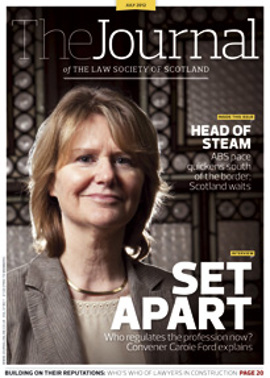Opinion column: Elaine Motion
In 1693 a Court of Session Act was passed which stated: “That in all tyme comeing all Bills Reports Debates Probations and others relating to processes shall be considered reasoned advised and voted by the Lords of Session with open doors where parties procurators and all others are hereby allowed to be present as they used to be formerly in time of Debates but with this restriction that in some speciall cases the saids Lords shall be allowed to cause remove all persons except the parties and their procurators”.
Therefore the presence of the parties and their lawyers before the court in Scotland was expressly guaranteed as a constitutional right in both civil and criminal cases. Only very limited exceptions applied.
Some may be heard to question what relevance this has today, but in reality the principles of an open court ring as true now as they did then – if not more.
The Justice and Security Bill, and in particular the extension of “closed material procedures” (“CMP”) to “relevant legal proceedings” (which includes proceedings before the Court of Session) appears to fly in the face of that philosophy.
At present, the use of this procedure has already been extended south of the border well beyond the initial intentions in relation to immigration/terrorism. It has apparently been used in employment cases to create the situation where an employee has been dismissed from his employment but is unable to obtain details of the reasons for dismissal (and therefore successfully challenge it) because of the use of CMP. Nor can he/she or their solicitor be present in court when argument is being heard in relation to documents considered to be “damaging to the interests of national security”.
The CMP process involves the appointment of a special advocate for such an individual. That special advocate is given access to the sensitive material and is therefore able to consider the documentation relevant to the client’s case. However after doing so he/she is effectively hamstrung. Unless given permission they are then unable to discuss or disclose any of that material to the solicitor or client in order to obtain instructions.
While accepting there have to be some very limited exceptions to an open court, is there a sound basis to extend this as proposed?
Some points to suggest not are:
It is said in defence of the bill that it will, in effect, allow more information to be placed before the court itself (as against being available to the solicitor or client) to enable justice to be done. If evidence cannot be properly challenged, how can justice be done and be seen to be done?
As has been outlined in the House of Lords, the Government may continue to use and rely on closed material even though other parties to the litigation are unable to see that material. That will result in the court having to issue a closed judgment – a judgment which is known of but the content of which is unavailable, either to the public or to non-Government parties, i.e. the client.
The Joint Committee on Human Rights concluded as long ago as 2009-10 that the use of special advocates in CMP “is not capable of ensuring the substantial measure of procedural justice that is required”.
In Al Rawi v Security Services [2011] UKSC 34 Lord Kerr of Tonaghmore warned: “To be truly valuable, evidence must be capable of withstanding challenge. I go further. Evidence which has been insulated from challenge may positively mislead. It is precisely because of this that the right to know the case that one’s opponent makes and to have the opportunity to challenge it occupies such a central place in the concept of a fair trial.”
The special advocates themselves submitted a collective response to the green paper expressing grave doubts as to the limitations inherent in their role.
Material may also be closed without there being any balancing exercise in which the competing national and public interests are weighed against each other. This is in stark contrast to the procedure already in place (public interest immunity (“PII”) certificates), which balances the risk to national security against the public interest. Documents can be excluded after due process or redacted to give limited access.
Again in Al Rawi, Lord Dyson stated: “unlike the law relating to PII, a closed material procedure involves a departure from both the open justice and the natural justice principles”.
What would you prefer?
In this issue
- On your marks
- Many's a crowd
- Family migration
- Assessing internet sex offenders
- Division and sale - disposal inter se
- Reading for pleasure
- Opinion column: Elaine Motion
- Council profile
- Book reviews
- President's column
- Into the front line
- A few more bricks
- Eye on the profession
- One eye over the border
- Who's who in construction
- Speed up child cases
- Take another look
- Relief on the review front
- Waste not
- Scottish Solicitors' Discipline Tribunal
- Financial services regulation: the race to reform
- Leases: where next?
- A wake-up call?
- Law reform roundup
- From the Brussels office
- Update: Registered Paralegal Scheme
- Business checklist
- Ask the experts
- Ask Ash






